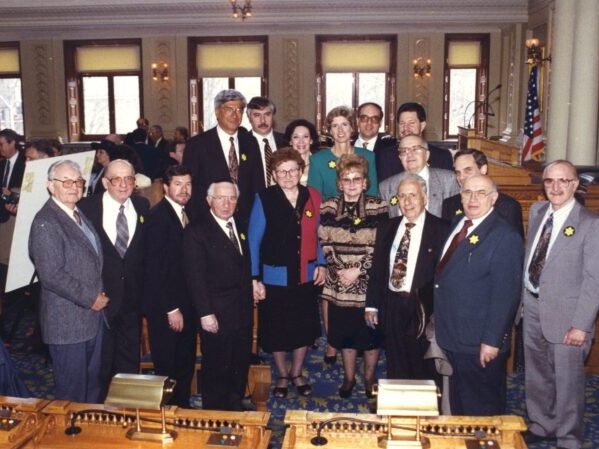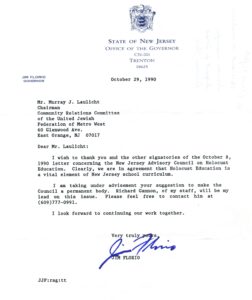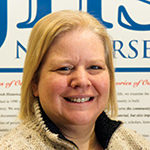
Last week in Trenton, State Senate and Assembly leaders from both sides of the aisle joined Jewish leaders to honor International Holocaust Remembrance Day. This was one of many occasions (like the one pictured here — see caption below) highlighting Federation’s longstanding partnership with the State in addressing Holocaust education and other important issues.
This year marks the 30th anniversary of the New Jersey State Legislature’s unanimous 1994 vote to make New Jersey the second state in the nation to mandate that every public-school student learn about the Holocaust and other historic acts of genocide. Arriving at this point was no small feat and was the result of years of collaboration between the organized Jewish community and state leaders.
The state of New Jersey first enacted a Holocaust education effort after two school districts, Teaneck and Vineland, asked for funding to create a Holocaust Studies program in 1974. Teachers from these districts collaborated to create The Holocaust and Genocide: A Search for Conscience’ curriculum which the state then used as a template for other districts to follow.
In 1982, New Jersey became the first state in the nation to form an Advisory Council on Holocaust Education, chaired by Jewish Federation of Central NJ’s Gerald Flanzbaum and instituted by Governor Thomas Kean Sr., who had a strong history in studying the Holocaust. This was considered a major step toward making New Jersey a leader in Holocaust education.
Throughout the state, various groups were dedicated to the implementation of Holocaust Studies on a local level but there was no statewide coordination.
The idea of providing content of Holocaust curriculum to Jewish educators and in communities with a large Jewish population was not a difficult sell. Various Holocaust-related curriculum and programs in Jewish day schools were already being funded by Federations and private donors. To further these efforts, in 1990, United Jewish Federation of MetroWest NJ (the predecessor to our current Federation) created the Holocaust Council with the goals of bringing public awareness of the memory of the Holocaust by means of advocacy and education through its vast network of local participating agencies and institutions.
 Our Jewish Historical Society of Greater MetroWest’s archive contains a letter (pictured here) from NJ Governor Jim Florio to Murray Laulicht, then chairman of the Community Relations Committee of the United Jewish Federation of MetroWest, agreeing about the importance of establishing a permanent State Holocaust Education Council.
Our Jewish Historical Society of Greater MetroWest’s archive contains a letter (pictured here) from NJ Governor Jim Florio to Murray Laulicht, then chairman of the Community Relations Committee of the United Jewish Federation of MetroWest, agreeing about the importance of establishing a permanent State Holocaust Education Council.
In 1991, the state created the NJ Holocaust Council, as well as the State Commission on Holocaust Education, chaired by Laulicht, to develop a mandated statewide curriculum.
Because the legislation was to include the instruction of the Holocaust and genocides, there was significant discussion over what constitutes genocide and what would be included in the curriculum. Soon a political battle over what was considered a genocide and if the language in the bill was inclusive enough. Compromises were made, loopholes were eventually addressed, and the bill was signed into law in 1994.
The Commission on Holocaust Education continues to require schools to have a curriculum and, as of 2023, Governor Murphy signed legislation requiring the commissioner of education and the New Jersey Commission on Holocaust Education to design and distribute a survey to measure how each school district is meeting the state’s requirement to include instruction on the Holocaust and genocide in an appropriate place in the curriculum of all elementary and secondary school students.
Through the work of Federation’s JCRC, Holocaust Council and other advocacy groups we have been the voice of our Jewish community by bringing valuable information and constructive dialogue to policy and policymakers.
Pictured above: Holocaust Remembrance Day ceremony in Trenton in 1996. Attendees included Governor Christine Todd Whitman, Commission on Holocaust Education chairperson Steven E. Some, Murray Laulicht, Auschwitz survivor Cantor David S. Wisnia, and others.
Research was from the Murray Laulicht papers in the Howard Kiesel Memorial Archives at the Jewish Historical Society of Greater MetroWest. The collection highlights his work as chairman of the Community Relations Committee and his role with the New Jersey Holocaust Commission. Included are correspondence with Peppy Margolis who was the director of Holocaust Programing for Federation.

